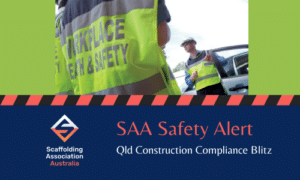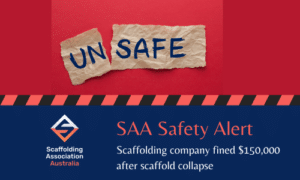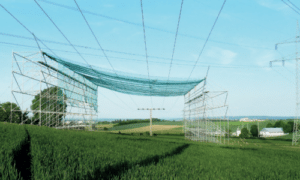This safety alert was issued by SafeWork NSW and the original can be found here

Plastic soleplate cracking during use. Plastic soleplates supplied without instructions for correct use.
This safety alert reminds persons conducting business or undertaking (PCBUs) and workers of the risks associated with plastic soleplates and provides advice on minimising those risks and complying with their duties under WHS legislation.
Soleplates, also called soleboards, prevent scaffolds sinking into soft surfaces by distributing the load over a larger surface area. Examples of soft surfaces include asphalt or compacted soil/gravel. Soleplates may also be used on harder surfaces such as concrete and pavements to provide surface protection.
SafeWork NSW observations
SafeWork NSW has seen an increased use of plastic soleplates which may be unsuitable for use. This includes:
- soleplates that have not been tested or assessed to ensure they can support the imposed loads and are compatible with typical working environments (UV exposure, acidic/alkaline soil or exposure to acidic work activities)
- soleplates supplied without instructions for correct use
- soleplates that have shown signs of failure including bending and even cracking under the weight of scaffolding.
Background
SafeWork NSW has observed multiple PCBUs using plastic soleplates, mainly on residential construction sites. Some of these products were unsuitable for use, showing signs of failure including bending and even cracking under the weight of scaffolding. PCBUs using these soleplates were not able to provide designer/manufacturer/supplier instructions for proper use of the product as required by WHS legislation.
Risks of using unsuitable plastic soleplates include:
- structural collapse of the scaffold which may result in serious injuries or even death of workers and others in a workplace
- falls from heights due to structural collapse
- falling objects due to structural collapse.
Action required
Work Health and Safety legislation requires PCBUs, persons with management control of structures and plant, designers, manufacturers, importers, suppliers and workers to manage risks to health and safety associated with using plastic soleplates.
Specific control measures
Designers, manufacturers, importers and suppliers must:
- ensure all necessary testing, calculations, analysis or examination have been carried out to determine they perform adequately with regards to intended loading conditions and service life. This may include load tests, UV resistance tests, acid resistance tests and other tests
- ensure information is passed along the supply chain explaining how their product is correctly used.
PCBUs who use plastic soleplates must ensure they are:
- used in accordance with the designer/manufacturer/importer/supplier instructions
- inspected and maintained in timely manner and not tampered with or modified. Inspection may be carried out at minimum every 30 days together as a part of scaffold.
Further information and guidance material
- Contact SafeWork NSW
- AS/NZS 1576.1:2019 Scaffolding General Requirements
- AS 4576:2020 Guidelines for scaffolding
- AS 1576.3:2015 Scaffolding Prefabricated and tube-and-coupler scaffolding
- Scaffold Industry Safety Standard 2022 (PDF, 11195.23 KB) NSW
- Speak Up Save Lives App
- Work Health and Safety Act 2011
- Work Health and Safety Regulation 2017






